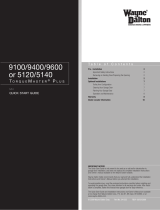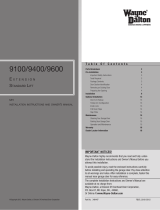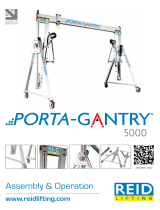
Page 2
NOTE: The trolley MUST be kept clean and dry and must be maintained in accordance with these instructions.
4.1. Lubrication.
a) Oil all working parts monthly or more in dusty conditions.
4.2. Inspection and Examination of trolley Before Use.
a) Before each use of the trolley you must perform an inspection for damaged, loose, missing parts, corrosion, wear, or other
irregularities.
b) The trolley must be examined immediately if it has been subject to an abnormal load or shock. It is recommended that such an
examination is made by an authorised service agent.
c) The owner and/or operator must be aware that repair of this equipment will require specialised knowledge and facilities.
It is recommended that an annual examination of the trolley is made by an authorised service agent.
d) Unauthorised parts may be dangerous and will invalidate the warranty.
Note! Please see the Definition of ‘inspection’ and ‘examination’ below.
Inspection:
Looking at the trolley for defects and checking the operation without loading the trolley.
This is much more than a check but does not normally require any part of the trolley to be dismantled.
Inspections are instigated by the user.
Examination:
Verification that the trolley can safely continue in service including a functional test to verify that it operates within the required
tolerances. An examination is more thorough than an inspection. All examinations and inspections should be carried out by a
competent person.
3. SAFETY / OPERATING INSTRUCTIONS
3.2 OPERATION. (Refer to Section 4.2 (a) regarding inspection before each and every use).
You must perform a risk assessment before undertaking any operations with the trolley.
a) Connect the trolley to the load using a suitable certified chain hoist or similar. Ensure you are aware of the load weight,
and check that it is within the capacity of the trolley and the support beam. Ensure you know the weight to be lifted.
b) Use only lifting points sufficient to hold the weight.
c) Lift only from directly above the load. WARNING! DO NOT LIFT THE LOAD AT AN ANGLE!
d) The load is moved by pushing the attached hoist or load. WARNING! you must seek assistance if the load size prevents
adequate visibility of the zone in front of the load.
e) When load has been secured, remove lifting sling, support beam etc. and place trolley in a safe location.
NOTE: ENSURE YOU HAVE READ AND UNDERSTOOD THE SAFETY INSTRUCTIONS AT THE BEGINNING OF THIS SECTION BEFORE YOU
OPERATE THE TROLLEY.
3.1 SAFETY
Keep trolley and beams in good working order and condition. Follow the inspection requirements as described in Section 4 page 2
Maintenance. Take immediate action to repair or replace damaged parts by contacting your supplier. Ensure that all accessory
lifting devices are suitably certified. If damaged, remove from service immediately.
The trolley is designed to travel on a beam and carry a load up to the rated capacity. The capacity indicated on the trolley (see nameplate)
is the maximum safe working load which must not be exceeded.
Keep children and unauthorised persons away from the working area.
Keep working area clean and tidy, free from unrelated materials and ensure that there is adequate lighting.
Ensure that load does not exceed the maximum capacity of the trolley. Overloading the trolley is dangerous. Where appropriate, use
only the lifting points recommended by the manufacturer of the item to be lifted, e.g. vehicle engine.
Ensure that load does not exceed the maximum capacity of the I Beam that the trolley is attached to.
Before lifting the load ensure that there are no obstacles which may snag the load whilst it is being lifted.
To avoid injury, be fully aware of your own and other persons locations in relation to the lifting, and lowering, of the load.
Keep a sound footing and balance, and ensure the floor is not slippery.
DO NOT harness the load at an angle or use any attachments not verified as fit for purpose.
DO NOT allow the load to swing during lifting.
Lower load with care, ensuring that you are fully aware of the condition of the surface onto which the load is to be placed.
DO NOT position any part of your body beneath the load.
DO NOT use this product to perform a task for which it is not designed.
DO NOT use whilst under the influence of drugs, alcohol or intoxicating medication.
DO NOT lift or transport loads while personnel are in the danger zone.
DO NOT allow personnel to pass under a suspended load.
DO NOT use the trolley for transportation of people.
DO NOT use the trolley in explosive or corrosive environments.
After lifting, DO NOT leave the load suspended for longer than necessary.
Start moving the load only after it has been attached correctly and all personnel are clear of the danger zone.
When not in use, store in a safe, dry, childproof area.
This trolley is designed for use within a garage or workshop environment.
WARNING! Failure to heed safety and warning instructions may result in damage and/or personal injury and will invalidate the
warranty.
4. MAINTENANCE / EXAMINATION / INSPECTION
Original Language Version PT500.V2, PT1000.V2, PT2000.V2, PT3000.V2 Issue:3 03/09/21







